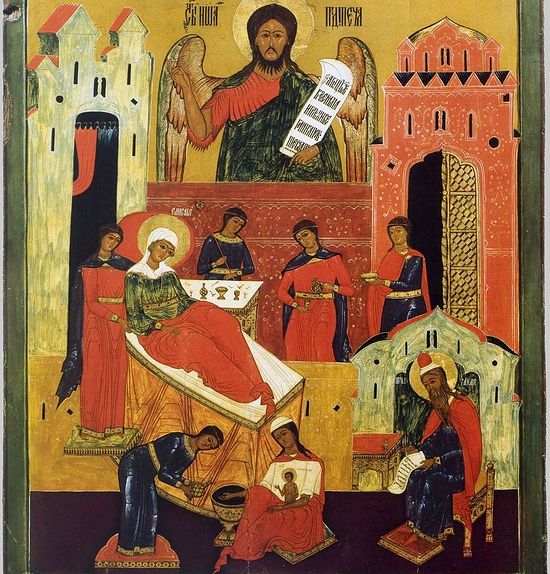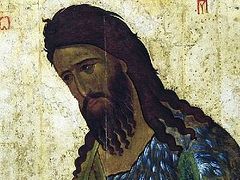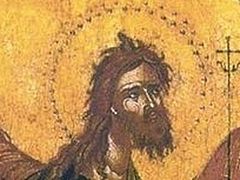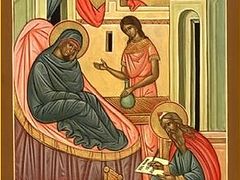The Reading from the Holy Gospel according to St. Luke. (1:1-25, 57-68, 76, 80)
Today in the holy Orthodox Church we celebrate a very important event in the life of the people of God. We celebrate the nativity, the birth of the one whom we call the Forerunner, St. John the Baptist. St. John is an amazing prophet and the Lord Jesus actually calls him the greatest born of a woman. Imagine just how important St. John must be that the Lord would speak so highly of him!
St. John is really the bridge between the Old and the New Testament for us. He connects the prophets of the Old Testament to the long awaited messiah of the new covenant. All of the Old Testament prophecies predicted the coming of the anointed one, the King of Israel and St. John fulfills his role as the last of the prophets in the mold of the Old Testament prophets like Elijah and Isaiah. A prophet has the role of correcting the people and bringing them back to God. St. John does exactly this and he does it while reminding all the people to prepare the way for the Lord and to make His paths straight. Where should we prepare the way? Where should we make the paths straight? Somewhere in Jerusalem? Somewhere in the wilderness? Perhaps somewhere here in this place? No.
St. John asks the people to prepare themselves. It is the heart and the mind that need to be prepared. It is the activities of our lives that need to be made straight. One paves the way for the other. We repent not out of thin air. We repent of actual deeds and thoughts and words and ideas that we hold within us. We repent of things that we’ve actually done wrong. When we start with this honest and brutal repentance where we are merciless with ourselves, we find that God Himself pours out His mercy on us and He does this in a way that we do not expect. He visits us. He visits us! We are preparing a way and making a straight path so that He can come and visit us and dwell with us. The Lord wants to make an abode in us. St. John tells us that God cannot get to us unless we first clear a path for Him to walk and find us. He reminds us that getting to God, or allowing God to get to us is really rather straightforward.
His birth was full of miraculous events as we hear in today’s gospel. His mother Elizabeth, whom we also celebrate today, was a great saintly woman. She was not only meek and holy but courageous and tough as nails. She was married to the priest Zacharias who was brutally murdered, but she did not blame God or sit and wallow in her tragedy. She fought to keep her son alive and in fighting to keep him alive she did God’s will. She hid her baby son in the wilderness to keep him safe and away from the threat of King Herod who was looking to kill all of the male infants at that time. She did this as an elderly woman. In suffering, she suffered for our benefit. In fighting for her son, she fought for each of us and our salvation.
The apple does not fall far from the tree because the holy mother and father brought forth a son who was also holy. One of the amazing verses that jumped off the page when I was reading this gospel passage was the words of the angel to Zacharias, the father of St. John. He says to him “And you will have joy and gladness, and many will rejoice at his birth; for he will be great before the Lord.” He was told that his son, his own flesh and blood would bring him joy and gladness. We are told that people would rejoice at his birth. We are told that he would be great before the Lord. I wonder if we raise our own children with these thoughts in mind? Do we have joy and gladness at the birth of our children? Hopefully. Joy and gladness represent something more than happiness. They represent a deep abiding presence of fulfillment with God’s work in our lives. Most people are happy when they have children, but sometimes happiness fades. Do we continue to have lasting joy? Do we raise these children in a way that allows others to also rejoice in them, or do people do the opposite when they see our children? Every child is cute at a young age. What happens when they get a little older? Do they delight others and bring joy? Do they bring joy to the Lord?
Will our children be great in the sight of God? I’m not suggesting that we can raise the next St. John the Baptist, there can only be one. But we can raise the next saints. It is our holy and solemn task and if you are a parent, it is one of the few tasks that you ought to be taking seriously. Zacharias and Elizabeth were holy. It is no wonder that St. John was holy.
Each of us has been baptized into the Lord Jesus and into His holiness. The potential is there my brothers and sisters, what are we doing with it? St. John’s life and the life of his parents is a reminder that many have suffered to bring this living faith to us. Who will take up the call to suffer and deliver this faith to others? Who will follow in the footsteps of St. John and live in the wilderness, cut off from the world? I’m not suggesting that you should really go to the wilderness, but that you should make part of each day a type of wilderness that is cut off from the world and it’s distractions.
The saints lives inform our lives. May the miraculous and powerful life of St. John the Baptist inspire us to prepare our hearts for the Lord through daily struggle and may future generations rejoice when they hear the stories of our lives and our faith in the Lord Jesus Christ to Him be the glory along with His Father and the Holy Spirit, now and ever and unto ages of ages, AMEN.




